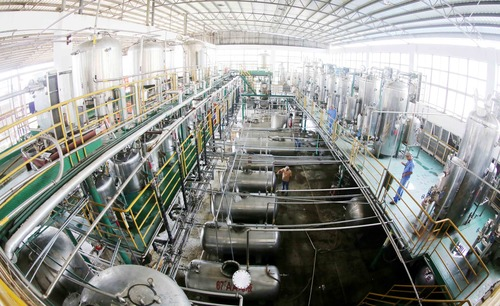KHARTOUM, April 25 (Xinhua) -- Three weeks into April, Sudan is ushering in an earlier summer as daytime temperatures climbed to over 45 degrees Celsius.
The sudden rise in temperatures augurs badly for the African country because it means an earlier than usual rainy season, and more mosquitoes spreading malaria in the country.
Liu Hongbo, 38, still sweating in his air-conditioned office in northern Khartoum, was lost in his thoughts on the production plans of his company "Shanghai-Sudan Pharmacies LTD," one of the leading producers of artemisinin-based drugs in the country.
Liu said the production of artemisinin-based drugs in his company had been at full speed and capacity since early April, and this year's output of the major product Artemether & Lumefantrine Tablets would be no less than 9 million, equivalent to the level of 2021.
"We are trying to build up an artemisinin umbrella for the Sudanese people against malaria, which still poses one of the gravest threats to public health in Sudan," Liu said.
Liu is the general manager of an eight-member Chinese team managing the Shanghai-Sudan Pharmacies LTD, which was established in 1998 by Shanghai Pharmaceuticals and the Sudanese health ministry.
Now the joint venture is selling anti-malaria drugs in all of the country's 18 states and enjoys some 80 percent share of the anti-malaria medicine in the country.
Esmat Nagi, 31, the Sudanese manager of the company, told Xinhua that 220 Sudanese people were working on the production lines of the company, which was a house-held name in his neighborhood and communities.
Artemisinin drug represents the first-line treatment for malaria and is available in most pharmacies in Sudan, according to Sudanese pharmacists.
"The Artemisinin drug has proved to be highly efficient," said Ahmed Abdalla Khidir, a pharmacist and owner of El Nadi pharmacies group in Khartoum, told Xinhua.
Al-Wathiq Mohamed Ahmed, a drug and toxicology expert in Sudan, said Chinese artemisinin medicines, particularly from the shanghai-Sudan pharmaceutical Co. Ltd, are more competitive than their counterparts from other countries in terms of quality and price.
The World Health Organization (WHO) estimated that more than 240 million people in sub-Saharan Africa have benefited from artemisinin treatment, and about 1.5 million patients have escaped death thanks to the treatment.




 A single purchase
A single purchase









